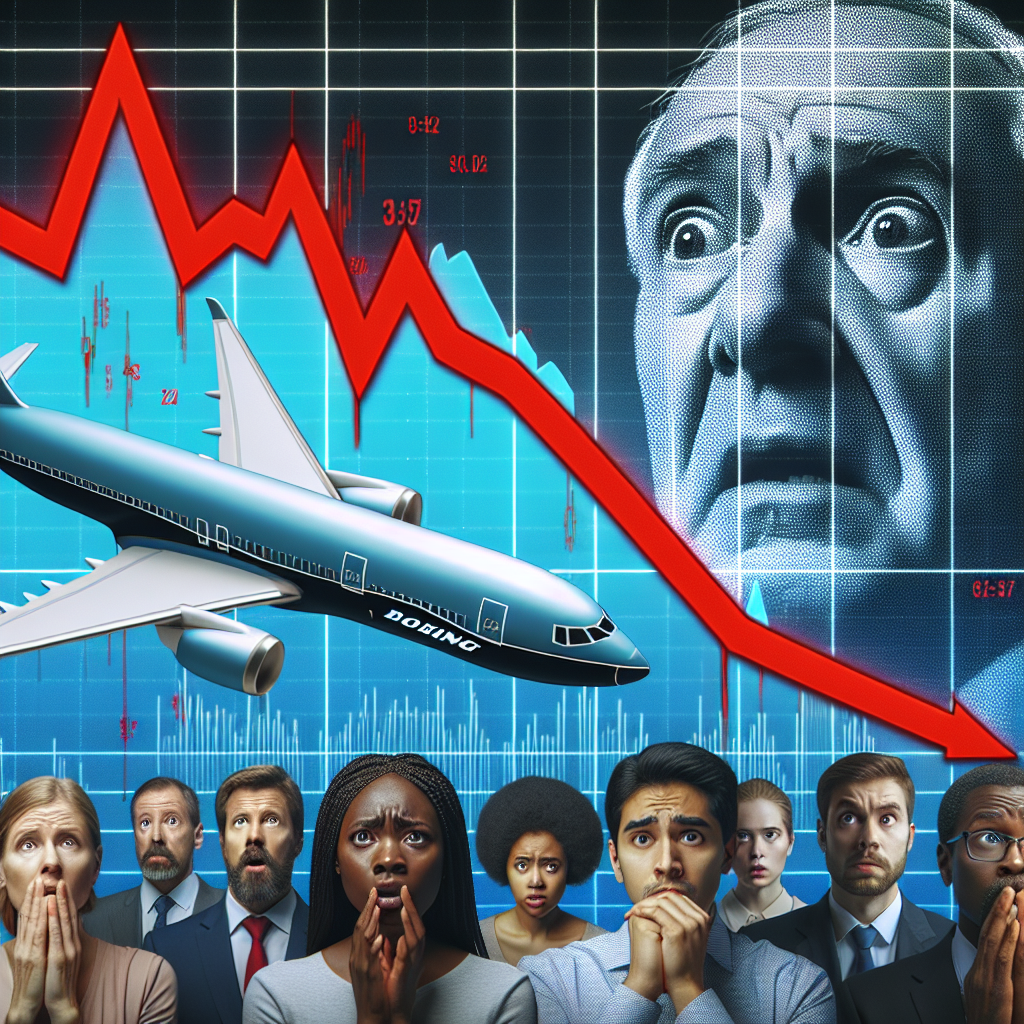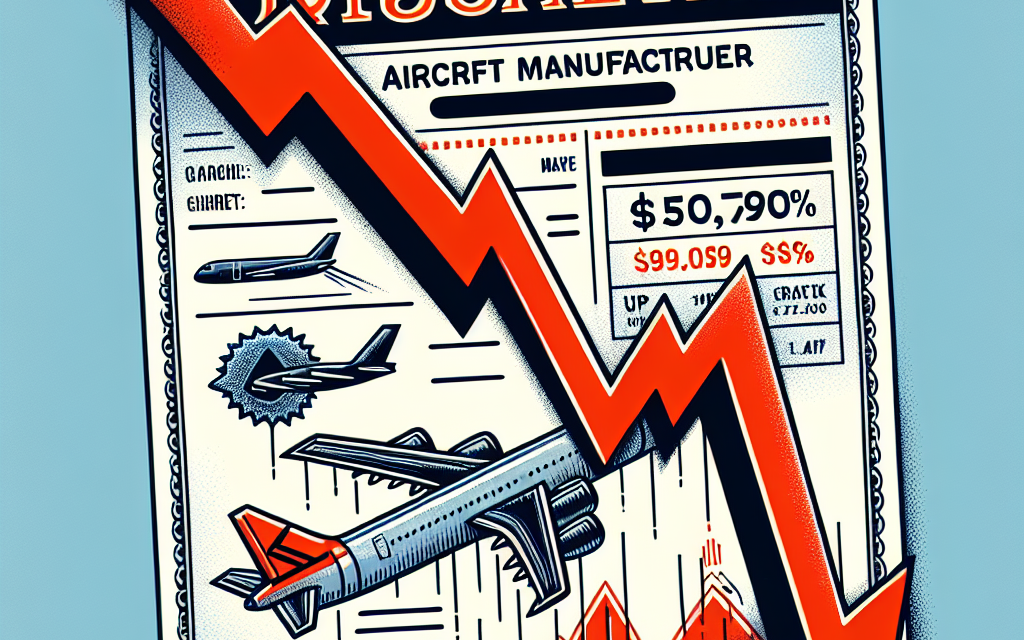“Brace for Impact: Boeing Shares on the Brink of a New Low”
Introduction
Boeing, a titan in the aerospace industry, has long been a staple in investment portfolios, renowned for its innovation and resilience. However, recent market analyses suggest that the company’s shares could face significant downward pressure, potentially plummeting to a critical threshold. This potential decline is attributed to a confluence of factors, including ongoing production challenges, regulatory scrutiny, and shifts in global demand for commercial aircraft. As investors brace for potential turbulence, understanding the underlying causes and implications of this projected downturn is crucial for navigating the uncertain skies ahead.
Analysis Of Boeing’s Current Financial Health
Boeing, a titan in the aerospace industry, has long been a staple in the portfolios of investors seeking stability and growth. However, recent developments have raised concerns about the company’s financial health, prompting analysts to speculate that Boeing shares could plummet to a critical threshold. To understand the potential trajectory of Boeing’s stock, it is essential to examine the factors influencing its current financial standing.
First and foremost, Boeing’s financial health has been significantly impacted by the prolonged grounding of its 737 MAX aircraft. This situation not only led to substantial financial losses but also eroded investor confidence. The grounding, which followed two fatal crashes, resulted in billions of dollars in compensation claims and production halts. Although the aircraft has since returned to service, the financial repercussions continue to weigh heavily on Boeing’s balance sheet.
In addition to the 737 MAX crisis, Boeing has faced challenges related to the COVID-19 pandemic. The global health crisis severely disrupted air travel, leading to a sharp decline in demand for new aircraft. Airlines worldwide deferred or canceled orders, further straining Boeing’s financial resources. While the aviation industry is gradually recovering, the pace of recovery remains uncertain, and Boeing’s order backlog has yet to return to pre-pandemic levels.
Moreover, Boeing’s financial health is also influenced by its competition with Airbus, its primary rival in the commercial aircraft market. Airbus has capitalized on Boeing’s recent struggles, securing significant orders and expanding its market share. This competitive pressure has forced Boeing to reconsider its pricing strategies and production schedules, potentially impacting its profitability in the long term.
Another critical factor affecting Boeing’s financial health is its defense and space division. While this segment has traditionally provided a stable revenue stream, recent contract delays and cost overruns have raised concerns. The development of the KC-46 tanker and the Starliner spacecraft, for instance, has encountered numerous setbacks, leading to increased scrutiny from investors and analysts alike.
Furthermore, Boeing’s debt levels have surged in recent years, primarily due to the need to finance ongoing operations and address the challenges mentioned earlier. The company has taken on significant debt to maintain liquidity, which has, in turn, increased its financial risk. As interest rates rise, servicing this debt could become more burdensome, potentially affecting Boeing’s ability to invest in future growth opportunities.
Despite these challenges, Boeing has taken steps to improve its financial health. The company has implemented cost-cutting measures, streamlined operations, and focused on enhancing its product offerings. Additionally, Boeing’s leadership has emphasized the importance of restoring trust with customers and regulators, which is crucial for long-term success.
In conclusion, while Boeing remains a formidable player in the aerospace industry, its current financial health is fraught with challenges. The combination of past crises, competitive pressures, and rising debt levels has created a precarious situation for the company. As a result, analysts caution that Boeing shares could plummet to a critical threshold if these issues are not addressed effectively. Investors should closely monitor Boeing’s efforts to navigate these challenges and assess whether the company’s strategies will be sufficient to restore its financial stability and investor confidence.
Factors Contributing To Boeing’s Potential Share Decline
Boeing, a titan in the aerospace industry, has long been a staple in the portfolios of investors seeking stability and growth. However, recent developments suggest that the company’s shares could face significant downward pressure, potentially plummeting to levels that may surprise even the most seasoned market observers. Several factors contribute to this potential decline, each interwoven with the complexities of the global aerospace market and Boeing’s internal challenges.
To begin with, the ongoing issues related to the Boeing 737 MAX continue to cast a long shadow over the company’s financial health. Despite efforts to rectify the problems that led to the grounding of this aircraft model, the repercussions are still being felt. The costs associated with legal settlements, compensation to airlines, and the implementation of safety upgrades have strained Boeing’s financial resources. Moreover, the reputational damage has been significant, leading to a loss of customer trust that could take years to rebuild. This erosion of confidence is likely to impact future sales, thereby affecting revenue streams and, consequently, share prices.
In addition to the 737 MAX debacle, Boeing faces stiff competition from its primary rival, Airbus. The European aerospace giant has capitalized on Boeing’s missteps, securing orders that might have otherwise gone to the American manufacturer. Airbus’s ability to deliver reliable aircraft on time has positioned it as a more attractive option for airlines looking to expand or renew their fleets. This competitive disadvantage for Boeing is exacerbated by the fact that Airbus has been making strides in developing more fuel-efficient and environmentally friendly aircraft, aligning with the industry’s shift towards sustainability.
Furthermore, the broader economic environment presents challenges that could further depress Boeing’s share value. The global economy is experiencing a period of uncertainty, with factors such as fluctuating oil prices, geopolitical tensions, and the lingering effects of the COVID-19 pandemic creating a volatile market landscape. These elements contribute to reduced demand for air travel, which in turn affects airlines’ purchasing decisions regarding new aircraft. As airlines tighten their budgets and delay fleet expansions, Boeing’s order book could suffer, leading to decreased production rates and lower revenues.
Another critical factor is the supply chain disruptions that have plagued the aerospace industry. The pandemic has highlighted vulnerabilities in global supply chains, and Boeing has not been immune to these challenges. Delays in the delivery of essential components can lead to production bottlenecks, increased costs, and missed delivery deadlines. Such disruptions not only affect Boeing’s ability to meet its financial targets but also strain relationships with customers who rely on timely aircraft deliveries.
Lastly, Boeing’s financial health is under scrutiny due to its substantial debt load. The company has taken on significant debt to navigate the crises it has faced in recent years, and servicing this debt requires a steady stream of revenue. Any downturn in sales or unexpected expenses could exacerbate financial pressures, leading to a reassessment of the company’s creditworthiness and, by extension, its share price.
In conclusion, while Boeing remains a formidable player in the aerospace industry, a confluence of factors suggests that its shares could face a significant decline. The lingering effects of the 737 MAX crisis, intense competition from Airbus, economic uncertainties, supply chain disruptions, and financial vulnerabilities all contribute to a challenging outlook. Investors should closely monitor these developments, as they could have profound implications for Boeing’s market performance in the near future.
Historical Trends In Boeing’s Stock Performance
Boeing, a titan in the aerospace industry, has long been a focal point for investors seeking to capitalize on its historical performance and future potential. Over the years, Boeing’s stock has experienced significant fluctuations, influenced by a myriad of factors ranging from technological advancements to geopolitical tensions. Understanding these historical trends is crucial for investors who are keen on predicting future movements and making informed decisions.
Historically, Boeing’s stock performance has been closely tied to its ability to innovate and adapt to changing market demands. In the early 2000s, Boeing’s shares saw a steady rise, driven by the company’s successful launch of the 787 Dreamliner, which promised greater fuel efficiency and advanced technology. This period marked a time of optimism and growth, as airlines around the world placed substantial orders, boosting investor confidence and driving up stock prices.
However, the financial crisis of 2008 brought about a significant downturn, as global economic instability led to reduced demand for new aircraft. Boeing’s shares, like many others, suffered during this period, highlighting the company’s vulnerability to broader economic trends. Despite this setback, Boeing demonstrated resilience by focusing on cost-cutting measures and strategic partnerships, which eventually led to a recovery in its stock performance.
As the 2010s progressed, Boeing’s stock experienced another surge, fueled by a booming aviation market and increased defense spending. The company’s strategic acquisitions and expansion into new markets further bolstered investor confidence. Yet, this upward trajectory was not without its challenges. The grounding of the 737 MAX in 2019, following two fatal crashes, marked a significant turning point. The crisis not only affected Boeing’s reputation but also had a profound impact on its financial performance, leading to a sharp decline in stock value.
In the wake of the 737 MAX debacle, Boeing’s shares struggled to regain their former glory. The COVID-19 pandemic further exacerbated the situation, as travel restrictions and reduced passenger demand led to a dramatic downturn in the aviation industry. Boeing, like many of its peers, faced unprecedented challenges, resulting in layoffs, production halts, and a reevaluation of its business strategies. Consequently, its stock price plummeted, reflecting the uncertainty and volatility of the times.
Despite these setbacks, Boeing has shown signs of recovery, driven by the gradual return of air travel and the recertification of the 737 MAX. However, the path to sustained growth remains fraught with challenges. Supply chain disruptions, fluctuating fuel prices, and geopolitical tensions continue to pose risks to Boeing’s operations and, by extension, its stock performance. Investors must remain vigilant, as these factors could potentially lead to further declines in Boeing’s share price.
In conclusion, while Boeing’s historical stock performance has been characterized by periods of growth and decline, the company’s ability to navigate these challenges will be crucial in determining its future trajectory. Investors should closely monitor industry trends, regulatory developments, and Boeing’s strategic initiatives to assess the potential risks and rewards. As history has shown, Boeing’s stock is susceptible to both internal and external influences, and understanding these dynamics is essential for predicting whether its shares could plummet to new thresholds or soar to new heights.
Impact Of Global Events On Boeing’s Market Value

Boeing, a titan in the aerospace industry, has long been a bellwether for the health of the global aviation sector. However, recent global events have cast a shadow over its market value, raising concerns among investors about the potential for a significant decline in its share price. The interplay of geopolitical tensions, supply chain disruptions, and evolving regulatory landscapes has created a complex environment that could drive Boeing shares to a critical threshold.
To begin with, geopolitical tensions have increasingly influenced the aerospace market, with Boeing being no exception. The ongoing trade disputes between major economies, particularly between the United States and China, have introduced a layer of uncertainty that affects Boeing’s international sales. As one of the largest exporters in the U.S., Boeing relies heavily on international markets for its commercial aircraft. Any escalation in trade tensions could lead to retaliatory measures, such as tariffs or restrictions, which would adversely impact Boeing’s revenue streams. Consequently, investors are wary of how these geopolitical dynamics might erode the company’s market value.
In addition to geopolitical factors, supply chain disruptions have emerged as a formidable challenge for Boeing. The COVID-19 pandemic exposed vulnerabilities in global supply chains, and the aerospace industry has been grappling with the repercussions ever since. Shortages of critical components, such as semiconductors and specialized materials, have led to production delays and increased costs. Boeing’s ability to deliver aircraft on time is crucial for maintaining customer trust and securing future orders. Persistent supply chain issues could undermine this capability, thereby affecting the company’s financial performance and, by extension, its share price.
Moreover, the regulatory environment is undergoing significant changes that could impact Boeing’s operations. In recent years, the company has faced heightened scrutiny from aviation authorities following high-profile incidents involving its aircraft. This has led to more stringent safety regulations and certification processes, which could increase operational costs and delay the introduction of new models. As regulators continue to prioritize safety and environmental concerns, Boeing may need to invest heavily in research and development to meet these evolving standards. Such investments, while necessary, could strain the company’s financial resources and weigh on its profitability, potentially leading to a decline in its market value.
Furthermore, the competitive landscape in the aerospace industry is intensifying, with emerging players challenging established giants like Boeing. Companies from countries with burgeoning aerospace sectors are making strides in developing their own commercial aircraft, aiming to capture a share of the global market. This increased competition could pressure Boeing to innovate and offer more competitive pricing, which might compress profit margins. As a result, investors are closely monitoring how Boeing navigates this competitive environment and whether it can maintain its market leadership.
In light of these factors, analysts have speculated that Boeing shares could plummet to a critical threshold if the company fails to effectively address these challenges. While Boeing has demonstrated resilience in the past, the confluence of geopolitical, supply chain, regulatory, and competitive pressures presents a formidable test. Investors are advised to remain vigilant and consider these global events when evaluating Boeing’s market value. As the situation continues to evolve, the company’s ability to adapt and innovate will be crucial in determining whether its shares can withstand the potential downward pressure.
Investor Sentiment And Boeing’s Stock Outlook
Investor sentiment plays a crucial role in shaping the stock outlook for major corporations, and Boeing is no exception. As one of the largest aerospace companies in the world, Boeing’s stock performance is closely watched by investors, analysts, and industry experts alike. Recently, there has been growing concern that Boeing shares could plummet to a new threshold, driven by a combination of factors that are influencing investor sentiment.
To begin with, the ongoing challenges in the aerospace industry have significantly impacted Boeing’s financial performance. The COVID-19 pandemic dealt a severe blow to the aviation sector, leading to a sharp decline in air travel demand. Although there has been a gradual recovery, the pace has been uneven, and the industry is still grappling with uncertainties. Consequently, Boeing has faced delays in aircraft deliveries and cancellations of orders, which have weighed heavily on its revenue streams. This has led to a cautious outlook among investors, who are wary of the company’s ability to navigate these turbulent times.
Moreover, Boeing has been dealing with a series of technical and regulatory issues that have further dampened investor confidence. The grounding of the 737 MAX aircraft following two fatal crashes was a significant setback for the company. Although the aircraft has since been cleared to fly again, the reputational damage and financial costs associated with the crisis continue to linger. Additionally, Boeing has encountered production challenges with its 787 Dreamliner, leading to further delays and increased scrutiny from regulators. These ongoing issues have raised concerns about Boeing’s operational efficiency and its capacity to meet future demand.
In addition to these internal challenges, Boeing is also facing external pressures that could impact its stock performance. The competitive landscape in the aerospace industry is intensifying, with rival Airbus gaining market share and emerging players entering the fray. This increased competition could put pressure on Boeing’s pricing power and profit margins, further affecting investor sentiment. Furthermore, geopolitical tensions and trade disputes have the potential to disrupt Boeing’s global supply chain and market access, adding another layer of uncertainty to its outlook.
Despite these challenges, it is important to note that Boeing remains a key player in the aerospace industry, with a strong order backlog and a robust portfolio of products and services. The company has been taking steps to address its operational issues, streamline its production processes, and enhance its financial position. However, the road to recovery is likely to be long and fraught with obstacles, and investors will be closely monitoring Boeing’s progress in executing its turnaround strategy.
In conclusion, while Boeing’s stock has the potential to plummet to a new threshold, it is essential to consider the broader context of the challenges and opportunities facing the company. Investor sentiment is influenced by a myriad of factors, including industry dynamics, regulatory developments, and competitive pressures. As such, investors should remain vigilant and informed, carefully weighing the risks and rewards associated with Boeing’s stock. By doing so, they can make more informed decisions and better navigate the complexities of the aerospace industry.
Boeing’s Strategic Initiatives To Mitigate Risks
Boeing, a titan in the aerospace industry, has long been a symbol of innovation and reliability. However, recent challenges have cast a shadow over its once unassailable reputation. As the company navigates through turbulent times, its strategic initiatives to mitigate risks are under intense scrutiny. The potential for Boeing shares to plummet to unprecedented thresholds looms large, prompting a closer examination of the measures being implemented to stabilize and rejuvenate the company.
To begin with, Boeing has been grappling with a series of setbacks, including the grounding of its 737 MAX fleet, supply chain disruptions, and the impact of the COVID-19 pandemic on global air travel. These challenges have not only affected its financial performance but have also eroded investor confidence. In response, Boeing has embarked on a comprehensive strategy aimed at risk mitigation and long-term sustainability. Central to this strategy is the company’s commitment to enhancing safety protocols and restoring trust in its aircraft. By investing in advanced safety technologies and rigorous testing procedures, Boeing aims to reassure both regulators and the flying public of its dedication to safety.
Moreover, Boeing is actively diversifying its product portfolio to reduce dependency on any single aircraft model. This diversification strategy includes expanding its presence in the defense and space sectors, which are less susceptible to the cyclical nature of commercial aviation. By leveraging its expertise in these areas, Boeing seeks to create a more balanced revenue stream that can withstand fluctuations in the commercial market. Additionally, the company is exploring opportunities in emerging markets, where demand for new aircraft is expected to grow significantly in the coming years.
In tandem with these efforts, Boeing is also focusing on cost management and operational efficiency. The company has initiated a series of cost-cutting measures, including workforce reductions and streamlining its production processes. These initiatives are designed to enhance profitability and provide the financial flexibility needed to weather future uncertainties. Furthermore, Boeing is investing in digital transformation to optimize its supply chain and improve production efficiency. By harnessing the power of data analytics and automation, the company aims to reduce lead times and minimize disruptions.
Despite these proactive measures, the path to recovery is fraught with challenges. The global aviation industry is still reeling from the effects of the pandemic, and the pace of recovery remains uncertain. Additionally, geopolitical tensions and trade disputes pose potential risks to Boeing’s international operations. In this context, the possibility of Boeing shares plummeting to new thresholds cannot be entirely ruled out. However, the company’s strategic initiatives provide a foundation for resilience and growth.
In conclusion, Boeing’s efforts to mitigate risks through safety enhancements, diversification, cost management, and digital transformation are crucial steps in navigating the current landscape. While the road ahead is challenging, these initiatives reflect a commitment to restoring stability and confidence in the company. As Boeing continues to implement its strategic vision, the potential for its shares to reach new lows serves as a reminder of the importance of adaptability and innovation in an ever-evolving industry. Through these endeavors, Boeing aims to not only weather the storm but emerge stronger and more resilient in the face of adversity.
Expert Predictions On Boeing’s Future Stock Price
Boeing, a titan in the aerospace industry, has long been a staple in the portfolios of investors seeking stability and growth. However, recent expert predictions suggest that Boeing’s stock could face significant challenges, potentially plummeting to levels that may surprise even the most seasoned market watchers. This potential downturn is attributed to a confluence of factors that have been brewing over the past few years, each contributing to a complex financial landscape for the company.
To begin with, Boeing has been grappling with the repercussions of the 737 Max crisis, which not only tarnished its reputation but also led to substantial financial losses. The grounding of the 737 Max fleet in 2019, following two fatal crashes, resulted in billions of dollars in compensation claims and production halts. Although the aircraft has since returned to service, the shadow of these events continues to loom large, affecting investor confidence and, consequently, the stock price. Moreover, the pandemic-induced downturn in global air travel further exacerbated Boeing’s woes, as airlines worldwide deferred or canceled orders, leading to a significant backlog and reduced cash flow.
In addition to these challenges, Boeing faces stiff competition from its European rival, Airbus. The latter has capitalized on Boeing’s struggles by securing new orders and expanding its market share, particularly in the lucrative single-aisle aircraft segment. This competitive pressure has forced Boeing to reconsider its strategies and investments, potentially impacting its financial performance in the short to medium term. Furthermore, the ongoing supply chain disruptions, exacerbated by geopolitical tensions and trade disputes, have added another layer of complexity to Boeing’s operational challenges. These disruptions have led to delays in production and delivery schedules, further straining the company’s resources and affecting its bottom line.
Another critical factor influencing Boeing’s stock trajectory is the broader economic environment. With inflationary pressures mounting and interest rates on the rise, the cost of borrowing has increased, potentially affecting Boeing’s ability to finance new projects and innovations. This economic backdrop, coupled with fluctuating fuel prices, has also impacted airlines’ profitability, indirectly influencing their purchasing decisions and, by extension, Boeing’s order book. As a result, analysts are closely monitoring these macroeconomic indicators to gauge their potential impact on Boeing’s financial health and stock performance.
Despite these challenges, it is essential to recognize that Boeing is not without its strengths. The company has a robust defense and space division, which has provided a steady revenue stream amid the commercial aviation downturn. Additionally, Boeing’s commitment to innovation and sustainability, as evidenced by its investments in next-generation aircraft and sustainable aviation fuels, positions it well for future growth. However, the path to recovery is fraught with uncertainties, and experts caution that any missteps could lead to a further decline in stock value.
In conclusion, while Boeing’s stock has the potential to rebound, the road ahead is laden with obstacles that could see its shares plummet to unforeseen thresholds. Investors must remain vigilant, keeping a close eye on the myriad factors at play, from internal operational challenges to external economic pressures. As the aerospace giant navigates this turbulent period, its ability to adapt and innovate will be crucial in determining its future stock price trajectory.
Q&A
1. **What is the current concern regarding Boeing shares?**
Analysts are concerned that Boeing shares could experience a significant decline due to various financial and operational challenges.
2. **What factors are contributing to the potential decline in Boeing shares?**
Factors include production delays, supply chain issues, regulatory hurdles, and potential decreases in demand for aircraft.
3. **What threshold are analysts predicting Boeing shares could plummet to?**
Analysts have suggested that Boeing shares could fall to a specific price threshold, though the exact figure may vary among different analysts.
4. **How have recent financial reports impacted Boeing’s stock outlook?**
Recent financial reports showing lower-than-expected earnings or revenue can negatively impact investor confidence, contributing to a bearish outlook on Boeing’s stock.
5. **What role do regulatory challenges play in Boeing’s stock performance?**
Regulatory challenges, such as delays in aircraft certification or compliance issues, can hinder Boeing’s ability to deliver products and affect its financial performance, impacting stock prices.
6. **Are there any positive factors that could mitigate the decline in Boeing shares?**
Positive factors might include successful resolution of production issues, new orders, or favorable market conditions that could stabilize or boost Boeing’s stock.
7. **What should investors consider when evaluating Boeing’s stock?**
Investors should consider Boeing’s financial health, industry trends, management strategies, and external factors such as geopolitical events or economic conditions when evaluating the stock.
Conclusion
Boeing shares could potentially plummet to a threshold driven by several factors, including ongoing production challenges, regulatory scrutiny, and market competition. The company’s financial performance may be impacted by delays in aircraft deliveries, increased costs, and potential penalties related to compliance issues. Additionally, global economic uncertainties and fluctuations in air travel demand could further pressure Boeing’s stock. Investors should closely monitor these developments, as they could lead to a significant decline in share value, potentially reaching a critical support level that reflects diminished investor confidence and market sentiment.





